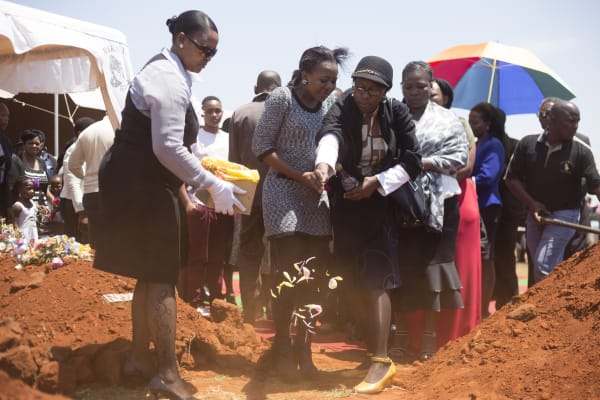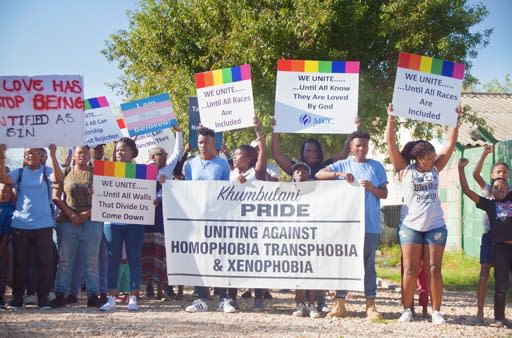Jenkins Johnson Projects presents Pride & Loss, a group exhibition curated by South African visual activist, Zanele Muholi, featuring works by the Inkanyiso collective including Muholi, Thembela Dick, Lerato Dumse, Boitumelo Nkopane, Collen Mfazwe, Thembi Mthembu, Lindeka Qampi, Velisa Jara and Lebogang Mashifane. The collective consists of South African visual activists and photographers who produce, educate, and disseminate information for the LGBTI community and marginalized people. This non-profit organization was conceptualized in 2006 and founded in 2009 by Muholi, who has dedicated her work and life to increasing the visibility of black lesbian, gay, bisexual, transgender and intersex people (LGBTI), whose lives are in constant danger due to their sexual orientation. Photographers, artists and activists of the Inkanyiso collective present photographs and videos from their archives that capture the joys and brutalities faced by the LGBTI community in South Africa. The exhibition will be punctuated with performances and events including a performance by Push Nqelenga and a closing celebration on June 16th called Same Sex Saturday, produced by Andiswa Dlamini, which occurs during NYC Pride and South African Youth Day.
Jenkins Johnson Projects presents Pride & Loss, a group exhibition curated by South African visual activist, Zanele Muholi, featuring works by the Inkanyiso collective including Muholi, Thembela Dick, Lerato Dumse, Boitumelo Nkopane, Collen Mfazwe, Thembi Mthembu, Lindeka Qampi, Velisa Jara and Lebogang Mashifane. The collective consists of South African visual activists and photographers who produce, educate, and disseminate information for the LGBTI community and marginalized people. This non-profit organization was conceptualized in 2006 and founded in 2009 by Muholi, who has dedicated her work and life to increasing the visibility of black lesbian, gay, bisexual, transgender and intersex people (LGBTI), whose lives are in constant danger due to their sexual orientation. Photographers, artists and activists of the Inkanyiso collective present photographs and videos from their archives that capture the joys and brutalities faced by the LGBTI community in South Africa. The exhibition will be punctuated with performances and events including a performance by Push Nqelenga and a closing celebration on June 16th called Same Sex Saturday, produced by Andiswa Dlamini, which occurs during NYC Pride and South African Youth Day.
A staggering four out of ten LGBTI South Africans know of someone who has been murdered "for being or suspected of being" lesbian, gay, bisexual or transgender. Despite South Africa legalizing same sex marriage in 2006, the country is still riddled with continuous homophobic violence, corrective rape and murdering of LGBTI people. For Muholi and the members of the Inkanyiso collective, just documenting the existence of LGBTI individuals can be a subversive act: Once, burglars broke into Muholi’s house and stole the hard drives containing her work. More recently, and violently, a member of the collective was beaten as we organized this exhibition. This discrimination and violence is even worse when coupled with race. Muholi grew up under Apartheid, in the “Bantu education” system that ensured that blacks would receive a substandard education and remain in the working class. Being present and visible is at the heart of visual activism. Muholi states, “We’re here queerizing spaces, blackening spaces.”
Pride & Loss plans to connect with local LGBTI people, in Brooklyn and throughout the five boroughs, and express kinship in the face of bias and erasure which occurs not just in South Africa, but also in the United States. There is a current spike of murders of transgender people, and at least 25 transgender people were killed in the United States in 2017, which makes it the deadliest year in at least a decade. These deaths are heartbreaking examples of the recent outbreaks transphobic, homophobic, and racist occurrences in America. Just last month the White House announced policy to ban transgender people from serving in the military- discriminating against the very people who would like to fight for our country. One of the worst mass shootings in the US occurred at the Pulse nightclub, targeting the gay community in 2016. In 2017 alone, more than 100 anti-LGBTI bills have been introduced in 29 states, including a law that prevents transgender people from using the bathroom of the gender with which they identify. A judge in Bakersfield, California ruled in February that a baker can refuse to make wedding cakes for same sex couples. These are just a few examples, which unfortunately there are many more.
These continuing injustices are put into a more drastic light on the 50th anniversary of the assassinations of Martin Luther King Jr. and Robert Kennedy, as many of the challenges they faced remain with us today. Dr. King, leader of the Civil Rights Movement, whose nonviolent resistance was inspired by Mahatma Gandhi, blazed the trail for the fight for equality for the LGBTI community today. Kennedy, former Attorney General and Senator, continued this trajectory in his presidential race, calling not for violence, but for compassion and justice towards those who suffer, whether black or white. King’s murder was a shocking blow to the country, and coupled with Kennedy’s assassination just two months later, violently removed two of the most important leaders of the time. Yet, their struggle for civil rights continues today in both the United States, South Africa, and around the globe.
These continuing injustices are put into a more drastic light on the 50th anniversary of the assassinations of Martin Luther King Jr. and Robert Kennedy, as many of the challenges they faced remain with us today. Dr. King, leader of the Civil Rights Movement, whose nonviolent resistance was inspired by Mahatma Gandhi, blazed the trail for the fight for equality for the LGBTI community today. Kennedy, former Attorney General and Senator, continued this trajectory in his presidential race, calling not for violence, but for compassion and justice towards those who suffer, whether black or white. King’s murder was a shocking blow to the country, and coupled with Kennedy’s assassination just two months later, violently removed two of the most important leaders of the time. Yet, their struggle for civil rights continues today in both the United States, South Africa, and around the globe.
Pride and Loss aims to contrast the rights afforded to citizens and the realities of violations of these rights for many LGBTI identifying citizens of South Africa. The collective’s photographs document the funerals of black lesbians in South Africa who were brutally murdered near their homes between 2013 and 2017. The images of brutality and deaths are juxtaposed with joyous images of the LGBTI community captured during weddings, pride and other events depicting love, peace and harmony. Zanele states, “I am producing this photographic document to encourage individuals in my community to be brave enough to occupy public spaces, brave enough to create without fear of being vilified, brave enough to teach people about our history and to rethink what history is all about; to reclaim it for ourselves, to encourage people to use artistic tools such as cameras as weapons to fight back.”
Eight of the ten participants of this exhibition are featured in Muholi’s award winning series Faces and Phases. In 2017, Muholi brought the Inkanyiso collective to New York and was featured in the “South African Pavilion Without Walls,” in the Performa 17 Biennial of performance-based art. In 2018, Aperture will release the monograph, Somnyama Ngonyama, featuring one hundred images from Muholi’s series and twenty-three texts by writers, artists and poets. Muholi’s work has been exhibited at Documenta 13; the South African Pavilion at the 55th Venice Biennale; and the 29th São Paulo Biennale. Solo exhibitions have taken place at the Autograph ABP, London; Stedelijk Museum, Amsterdam; Kulturhistorek Museum, Oslo; Einsteinhaus, Ulm; Schwules Museum, Berlin; Casa Africa, Las Palmas and Brooklyn Museum, New York. Her work is included in the collections of the Boston Museum of Fine Arts; the Brooklyn Museum; the High Museum of Art; the Carnegie Museum of Art; the Guggenheim Museum; the Museum of Modern Art, New York; the San Francisco Museum of Modern Art; the Tate Modern, London; and the Victoria and Albert Museum, London among others.










